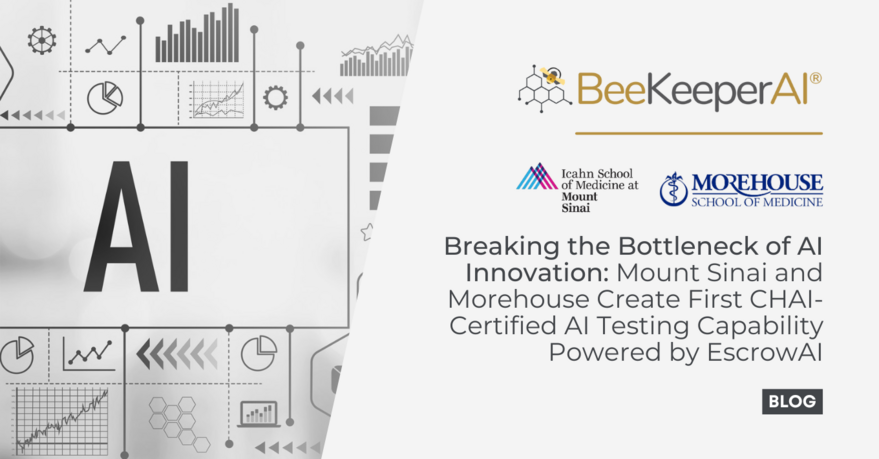
A common experience is that rigorous testing and validation of AI algorithms on diverse, clinical data requires months of navigating privacy hurdles and slow, siloed approvals—time that could otherwise be spent advancing promising solutions. But what if you could streamline the process and move at the speed of innovation?
The Critical Gap in Healthcare AI Testing and Validation
While artificial intelligence (AI) holds tremendous promise for improving outcomes for all patients, a fundamental challenge has persisted: how to rigorously test AI algorithms on diverse, real-world clinical data without compromising patient privacy or intellectual property.
This challenge is particularly problematic for underserved and underrepresented patient populations as traditional AI testing processes typically rely on limited datasets that may not reflect the full spectrum of patient diversity. As a result, the models may perform well in validation testing but yield negative or null impact for patients with lower resource availability in real-world clinical environments. Fortunately, new collaborations between data stewards using our privacy-preserving platform have been gaining traction in overcoming this longstanding challenge.
“AI has the potential to transform care delivery, but only if models are proven to be accurate, safe, and effective in real-world settings,” said Tanvir Kahlon MD, MBA, Assistant Professor, Advanced Heart Failure and Transplant, Interventional Cardiology at Icahn School of Medicine at Mount Sinai. “Our work with BeeKeeperAI and Morehouse School of Medicine makes that assurance possible—without compromising privacy or integrity.”
Three Partners, One Vision
The partnership between BeeKeeperAI, Mount Sinai's Icahn School of Medicine, and Morehouse School of Medicine represents a major milestone as the first successful implementation of the Coalition for Health AI’s (CHAI) certified testing platform. Using our privacy-enhancing infrastructure, the collaborators have produced a curated chronic heart failure dataset that includes clinical, demographic, and social determinants of health data—soon to be enriched with imaging data.
What makes this dataset uniquely valuable is the inclusion of significant numbers of diverse, typically underrepresented patient populations that are disproportionately impacted by chronic heart failure. This unique data set provides the algorithm developers with the opportunity to test their models against truly representative, real-world clinical patient data in a secure, standardized environment. With this dataset and elegant privacy preserving computing environment, the collaboration eliminates the risk of model evaluations that fail to reflect clinical reality. The collaboration provides algorithm developers with push-button access to CHAI-certified testing workflows on privacy protected, diverse clinical data—securely, quickly, and at scale.
“By enabling AI developers to securely compute on our data, we’re creating the foundation for algorithms that can reduce readmissions and mortality for those most at risk,” said Dr. Muhammed Y. Idris of Morehouse School of Medicine.
Setting Industry Standards Through CHAI Certification
The collaboration is certified under CHAI’s Assurance Service Provider model, establishing a precedent for how health systems and AI developers can work together responsibly. CHAI, a not-for-profit, is the leading coalition driving responsible AI adoption in the health sector, setting the gold standard for AI best practice. The testing platform follows CHAI's algorithm scorecard and ethics guidelines, ensuring that performance evaluation includes considerations of fairness, transparency, and real-world applicability.
Dr. Brian Anderson, CEO of CHAI, explores the broader mission saying, “As we advance our mission to enable responsible, evidence-based AI, this is just the first of many collaborations where CHAI-certified service providers and health institutions will work together to ensure AI serves all patients.”
EscrowAI: The Technology Behind The Breakthrough
The technical foundation of this collaboration rests on our EscrowAI platform, which allows AI model testing inside a health system data provider’s secure, HIPAA compliant environment by leveraging Trusted Execution Environments (TEEs) with confidential computing to create secure testing conditions. In other words, this infrastructure allows AI models to be evaluated against sensitive, real-world clinical data while maintaining the strictest protections for both patient privacy and proprietary algorithm intellectual property throughout the entire process.
EscrowAI delivers reproducible, auditable, CHAI-aligned performance reports in a SOC 2-compliant environment—eliminating traditional data access bottlenecks in AI testing and creating a transparent path to regulatory-grade readiness.
"With EscrowAI, Mount Sinai and Morehouse enable AI developers to securely test their models on high-value, clinical data in days—not months—while preserving patient privacy and protecting model IP. These collaborations are how we unlock faster, scalable, and responsible AI innovation in healthcare," said Dr. Michael Blum, CEO of BeeKeeperAI.
Toward a More Transparent AI Ecosystem
Morehouse and Mount Sinai are making their data available for independent, third-party testing and validation of heart failure and other cardiology-based algorithms, aligned with CHAI’s algorithm scorecard and ethics guidelines. This initiative reflects a market-based shift toward transparent, reproducible evaluation practices—especially for AI tools intended to serve high-risk, resource-limited populations.
The implications extend well beyond heart failure algorithms. This framework can be applied across medical specialties and clinical applications, creating a foundation for responsible AI development that prioritizes both innovation and optimal outcomes for all patients.
This collaboration demonstrates that the healthcare AI industry does not need to choose between rapid innovation and responsible development. Instead, it highlights how the right infrastructure and partnerships can deliver both simultaneously, creating better outcomes for all patients.

Comments